The nearly 14 million people of color who live in rural America face unique challenges that run the gamut — from navigating racism in real estate, environmental regulation and the justice system to gaining access to healthcare and broadband. This six-part series from the Rural News Network, made possible with support from the Walton Family Foundation, explores the issues these communities are facing and what some are doing to change their fates.
(RNS) — In the riverfront city of New Bern, North Carolina, Peletah Ministries, like many houses of worship since COVID-19 struck, offers Sunday services to those who can’t get to church for health or other reasons. But in these days of Zoom and other internet-based communications, the stay-at-home congregants still dial in to the service via a conference call on the ministry’s toll-free 800 number — a landline.
“People still call it, and they still do church services that way,” said Dawn Baldwin Gibson, the ministry’s executive director. “They still do their Bible studies that way. A lot of people just don’t have devices in their homes, or they don’t have access to the internet.”
Early in the pandemic, Black churches often struggled to make the switch to remote services for lack of broadband in their area. Even if a church had the wherewithal to livestream services or hold meetings on video platforms, congregants lacked the connections to take advantage. A 2020 Pew Research Center study showed that while 92% of evangelical Christians and 86% of mainline Protestants could watch services online, only 73% of worshippers in the historically Black traditions said the same.
Today in the rural South, 38% of Black households do not have access to broadband, compared with 23% of white households, according to the Joint Center for Political and Economic Studies.
Black clergy and faith leaders in the rural South have been working for years to bridge the digital divide in their communities and congregations, and a pandemic-era federal program gave those efforts a boost by offering discounted internet access. But fewer than half of the estimated 49 million Americans who are eligible have enrolled, and now questions loom about the program’s long-term funding by Congress.
The Federal Communications Commission’s Affordable Connectivity Program offers discounted internet access and one-time discounts on laptop, desktop or tablet purchases. Any household whose income amounted to less than 200% of the Federal Poverty Line qualifies, as do those earning above that line but who receive any of a variety of public benefits. To date, more than 21 million households have enrolled in the program.
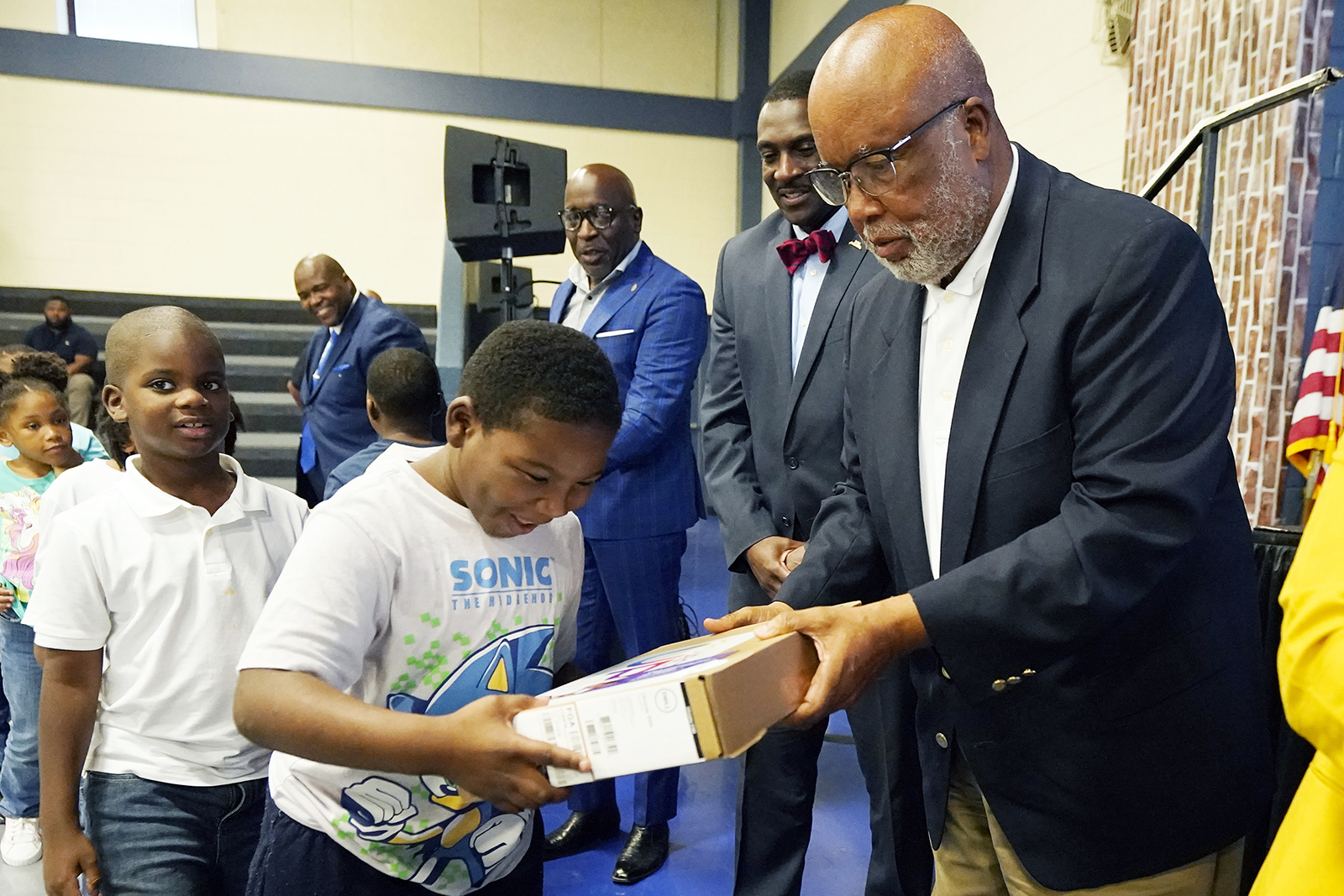
U.S. Rep. Bennie Thompson, D-Miss., right, hands a Bolton-Edwards Elementary/Middle School student a new laptop during a celebration hosted by media and technology company Comcast, announcing that it completed a broadband expansion effort in the neighboring towns of Bolton and Edwards, Aug. 22, 2023, in Bolton, Miss. Nearly 400 laptops were donated to students of the two schools as part of the celebration. (AP Photo/Rogelio V. Solis)
RELATED: Black churches lagged in moving online during COVID
In North Carolina, the state's Department of Information Technology has set a goal of enrolling 1 million state residents in the ACP by year’s end, said Cristalle H. Dickerson, spokesperson for the department's Broadband and Digital Equity division. So far, more than 850,000 households have signed up.
To that end, it is partnering with faith-based organizations such as Peletah to get the word out. Other faith networks, including The Balm in Gilead and the National African American Clergy Network as well as national Black denominations are working on these efforts, which include pleas to members of Congress to replenish funding for the program, which could be depleted by early 2024.
Gov. Roy Cooper has also encouraged internet service providers in the state to lop an additional $30 from the monthly fees of individuals who qualify for the ACP.
In many areas, urban or rural, Black communities depend on their churches for more than spiritual uplift; members and nonmembers turn to local Black-led churches for everything from child care to medical services. During the pandemic, Black churches were crucial partners with government agencies in providing COVID-19 vaccines and testing.
Fallon Wilson, vice president for policy of the nonpartisan Multicultural Media, Telecom and Internet Council, said that the model forged in the pandemic can be replicated to bridge some of the gaps in digital access that were exposed in 2020.
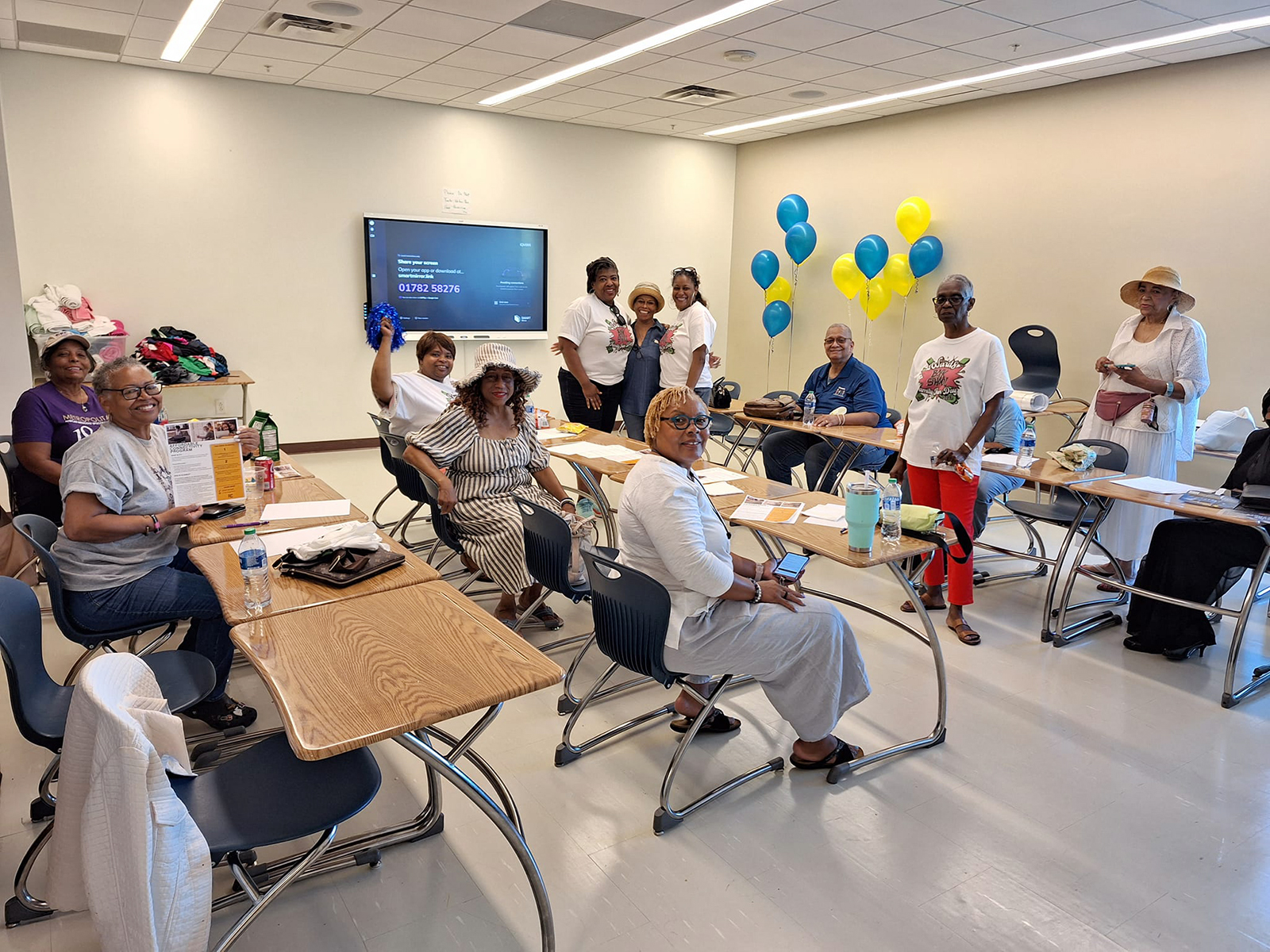
Black Churches 4 Digital Equity's 2023 Affordable Connectivity Program National Day of Action took place on Aug. 19, 2023. Participants pause from a training to pose together at Ballou Senior High School in Washington, D.C. Photo by Ananda Leeke
Wilson's organization helped create Black Churches 4 Digital Equity to build that potential among Black clergy. The group brings pastors together with FCC and state broadband officials while also holding events where community members are invited to sign up for the ACP. After launching “ACP Days of Action” last year, the initiative's partners have held similar events this summer across a dozen and a half mostly Southern states and the District of Columbia.
Wilson said: “Our churches just see it as a way to, number one, reduce the cost of internet because it is really expensive but also a way to get devices into the hands of their community members.” Anyone who has a Pell grant or receives benefits through the Supplemental Nutrition Assistance Program can get a $30 subsidy toward an internet bill and $100 discount for a personal computer.
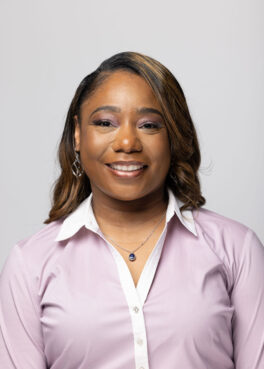
Pamela Price. Photo by Dwayne Morris
Pamela Price, deputy director of The Balm in Gilead, a Virginia-based organization that works with Black congregations on health improvement, discovered the severity of the disparity in internet access in the rural South when Balm in Gilead moved to shift its diabetes prevention program from in-person to online shortly after the start of the pandemic. The vast majority of the approximately 600 clients the organization was working with “only had a smartphone and/or a tablet,” usually the only such device in their home.
“We just kind of take for granted that there has to be at least one laptop,” said Price, but many participants’ homes had no computer at all.
A significant majority did not have an internet connection reliable enough to listen to a 60- to 90-minute class. A quarter of them, mostly those in Mississippi and Alabama, were unable to participate because of access issues.
Those findings helped spur Price, who is also a fellow of Black Churches 4 Digital Equity, and The Balm in Gilead to work with congregations in six southeastern states last year to hold events that provided hundreds of families an opportunity to sign up for the Affordable Connectivity Program.
In Canton, Mississippi, which has a population of about 11,000, Balm in Gilead representatives hosted a lunch in September at St. Paul African Methodist Episcopal Zion Church, where they served fried chicken, broccoli casserole and candied yams and handed out door prizes — as well as about 100 applications.
“Many people there did not have internet,” said Tanya Henderson, a program director for Balm in Gilead who traveled to the event. Most of those attending were senior citizens or parents of school-age children. The money they saved on broadband services, they said, would go for groceries, medicine and other expenses.
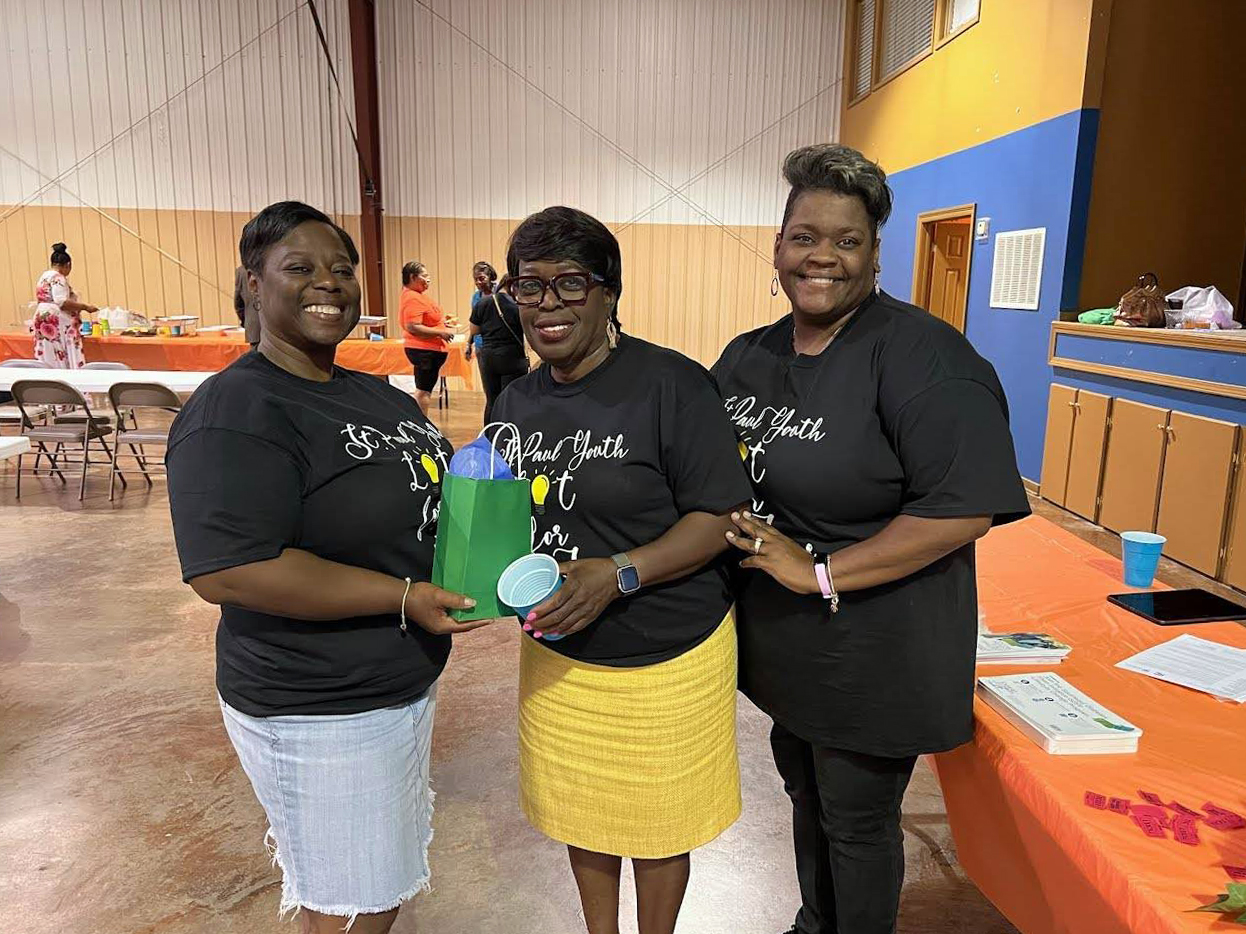
Kimberly Anthony, from left, the Rev. Belinda Johnson and LaDonna Watkins pose together during an Affordable Connectivity Program workshop at St. Paul African Methodist Episcopal Zion Church in Canton, Miss., on Sept. 17, 2023. Courtesy photo
“Whole families came by; people were eager to get applications for their other family members as well,” said the Rev. Belinda Johnson, an associate minister of the church who also is a state manager for Balm in Gilead’s diabetes prevention program. “The activity was from 1 to 3. We even had somebody come at 3 o'clock, running in the door, trying to make sure that they got the application.”
In all, more than 230,000 Mississippi households have enrolled in the program.
Some low-cost internet carriers have taken advantage of the program and skirted some of the government's rules, The Washington Post reported last year. Shady marketing tactics, Johnson said, is one reason people in her area appreciate learning about ACP through a church.
"We are a community church, and we do a lot in the community," she said of her congregation, which is more than 170 years old. "They trust us, and they know us."
The Rev. Quardricos Driskell, a Baptist pastor in Alexandria, Virginia, and federal lobbyist, represented the Black Churches 4 Digital Equity as Black church advocates sought congressional action for the subsidy.
“As a result of our efforts, Congress passed the Emergency Broadband Benefit, and that was the first time in this country that a subsidy was created for the Internet,” he told Religion News Service.
Now the organizations involved are pushing to get the same backing for ACP. The Rev. Barbara Williams-Skinner, co-convener of the National African American Clergy Network, has distributed a sample letter it is encouraging faith leaders to send to political representatives.
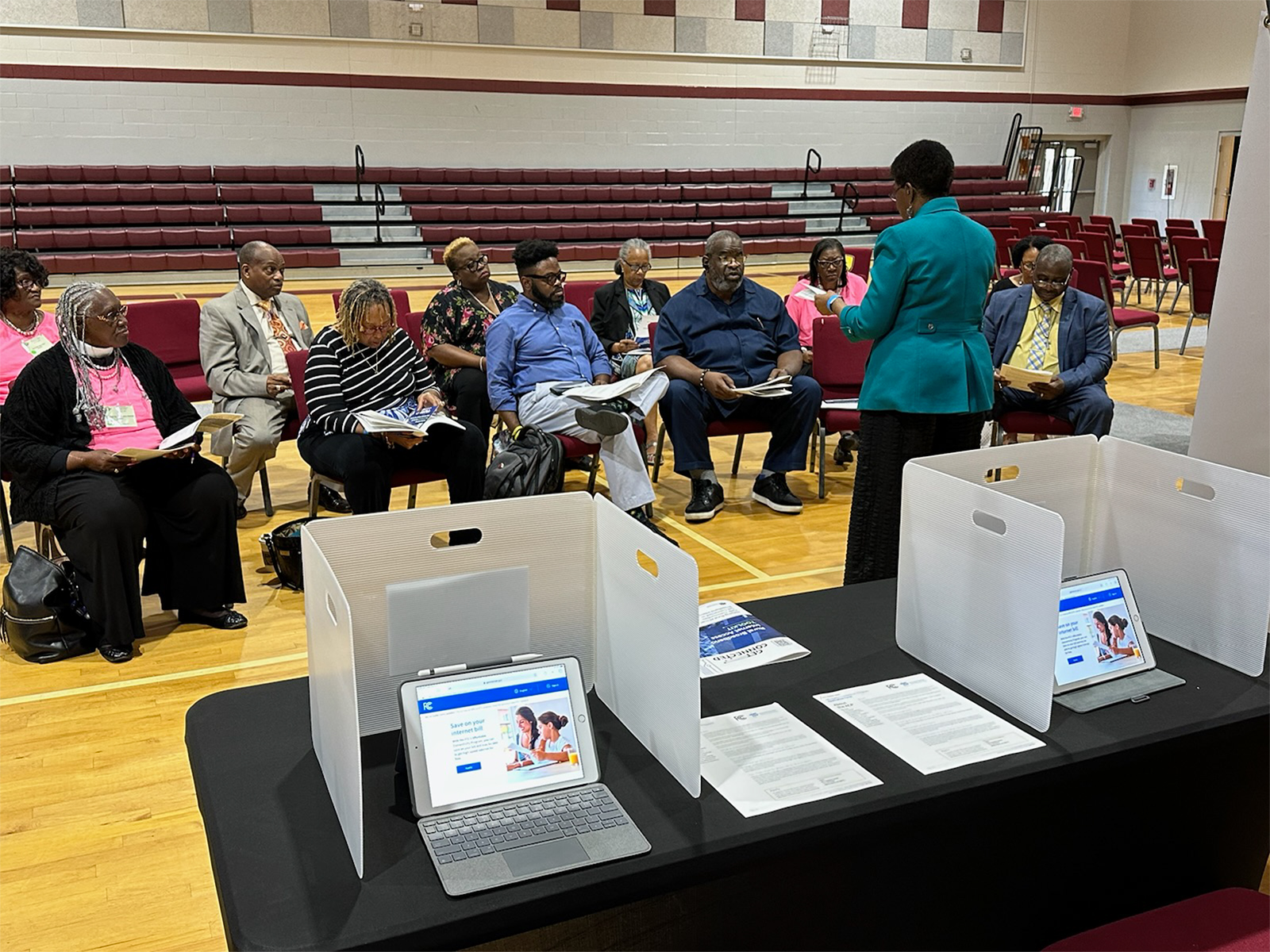
The Rev. Barbara Williams-Skinner, right, leads a Train the Trainer session in Alabama about the Affordable Connectivity Program, May 31, 2023. Photo courtesy of Williams-Skinner
“Based on current take rates, the funding appropriated for the ACP program ($14.2B) could be exhausted in late 2023 or early 2024,” the letter states. “Congress must act now to replenish ACP funding for a few years until longer-term subsidy reforms are in place. If the ACP program expires, millions of households, and hundreds of thousands across the south, will lose financial support for their broadband needs.”
Williams-Skinner has been leading training events in several Southern states in recent months to build awareness about the Affordable Connectivity Program.
“What surprised me — I guess, shocked me — was the number of churches that don’t have any internet at all and are doing church by phone,” she said. “There are churches near, and people near, places where there are no internet carriers at all. There are no towers at all. So you have people going and sitting outside of hotels, restaurants to do homework or to get online to talk to their doctor, or all of the things you and I take for granted.”
Though much of the rural South may deal with lack of access, residents of more urban settings do as well.
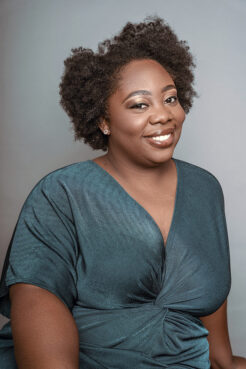
Kanika Welch. Courtesy photo
Kanika Welch, executive director of The Bean Path, a technology education nonprofit in Jackson, Mississippi, that works with Black Churches 4 Digital Equity, said she spoke at a school in the state's capital earlier this year and found that some students said they knew someone who didn’t have internet in their homes or didn’t have a laptop or desktop computer.
“People are raising their hands in 2023,” she said. “I think that just goes to show we still have a lot of work to do. The internet, at this point, is not a privilege. It’s a right. You need the internet to live.”
This reporting is part of a collaboration with the Institute for Nonprofit News' Rural News Network, and the Energy News Network, Flatwater Free Press, Mississippi Free Press, New Mexico In Depth, Religion News Service and Sierra Nevada Ally. Support from the Walton Family Foundation made the project possible.
RELATED: Black churches, via phones and Facebook, bridging digital divide amid COVID-19





